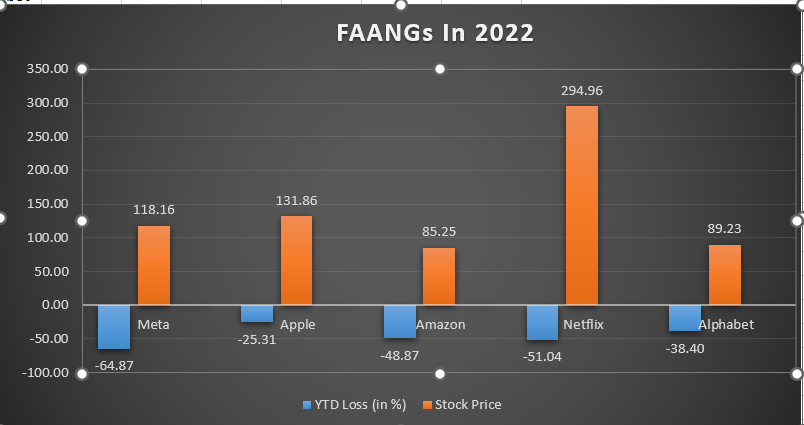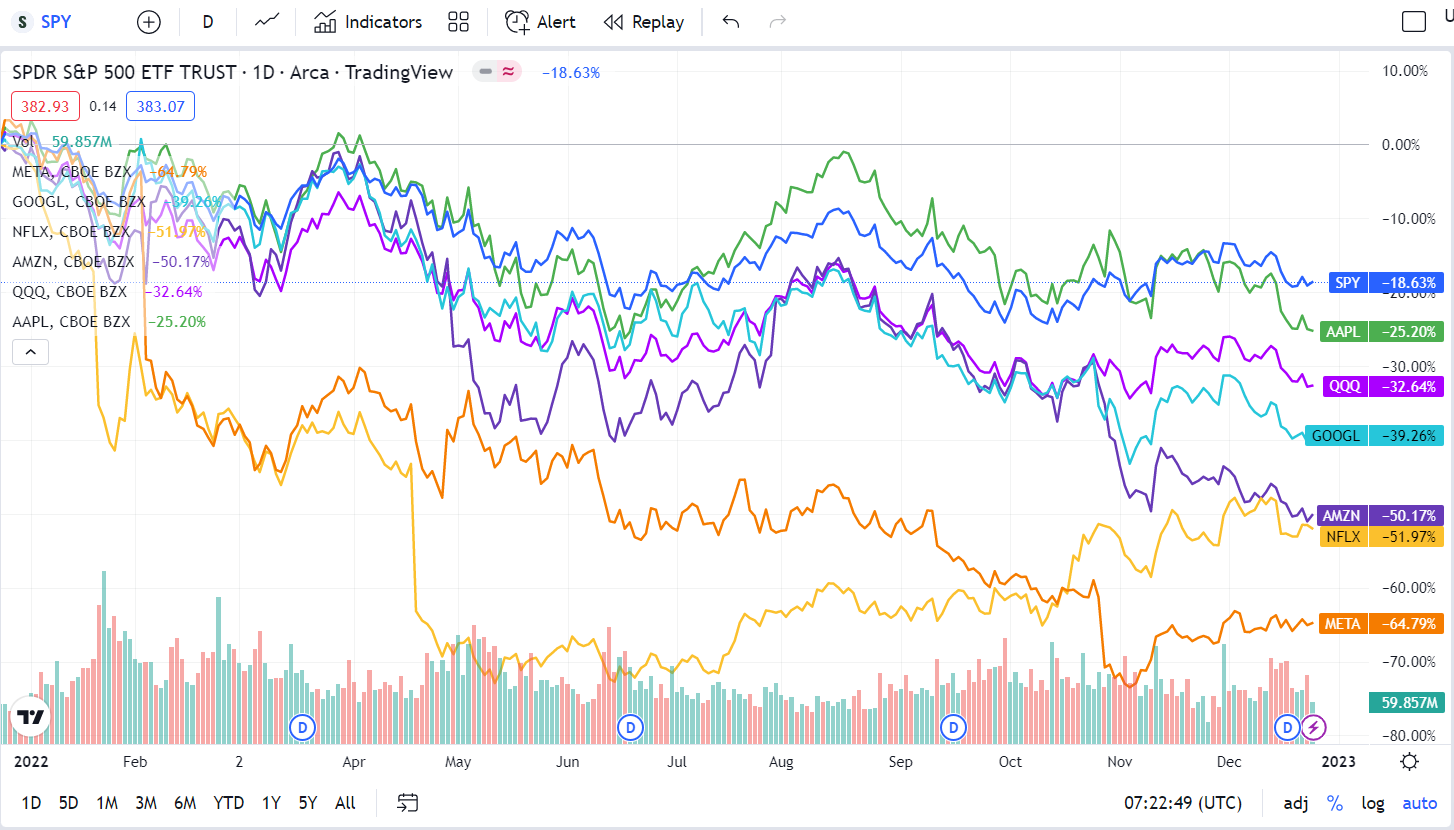Zinger Key Points
- Tech stocks have led 2022's market sell-off and have underperformed the broader market.
- Big techs alone have lost $2.5 trillion in market value, according to JPMorgan.
- Pelosi’s latest AI pick skyrocketed 169% in just one month. Click here to discover the next stock our government trade tracker is spotlighting—before it takes off.
Tech stocks just had their annus horribilis. The sell-off in the space was so indiscriminate that most shed billions or millions from their market capitalizations.
The tech-heavy Nasdaq Composite Index has lost almost twice as much as the broader S&P 500 Index, underlining the skewed nature of the market sell-off toward the tech space.
Falling Off The Cliff: The economy did have a part in the tech meltdown, but it alone cannot be squarely blamed. Tech stocks were on an extended run between 2016 and 2021, pushing valuations of many equities to unsustainable levels, Christopher Baggini, global head of equity strategy of JPMorgan Asset & Wealth Management, said in a note.
See Also: Best Technology Stocks Right Now
These valuations, according to the analyst, could not be sustained in a higher interest rate environment. The situation got worse with the “complicated dynamics of slowing economic growth, uneven demand, inventory management and gradually improving supply chains,” he said.
For taking stock of the ravages, we don’t have to look past the big techs, which now look like a pale shadow of their old selves.
The FAANG stocks, save Apple Inc. AAPL, are down by much more than the Nasdaq Composite as well as the Nasdaq 100 Index. Meta Platforms Inc. META has the worst loss for the year so far in this category, followed by Netflix Inc. NFLX and Amazon Inc. AMZN.
Apple also has had its fair share of problems, especially with the concentration of its production base in China hurting output and shipments.

Source: Proprietary chart
It was against this backdrop that these companies began shifting their focus on operational discipline in a bid to preserve margins. The result: thousands of employees taken off payrolls, cost cuts, projects shelved and unprofitable divisions shut down.
Meta for one announced massive layoffs numbering 11,000 in November. When Elon Musk took Twitter private, he planned a three-quarter reduction in payrolls.
Future Is Tense: Despite the extremely attractive valuations, not many analysts agree that a reversal is around the corner. Macroeconomic headwinds could prove to be a pushback for the sector, as circumspect consumers abstain from huge purchases.
The Federal Reserve under Jerome Powell has signaled that rate hikes could continue well into 2023, albeit at a slower pace. This has a direct bearing on consumer spending. Inflationary pressure, though abating, still runs high, leaving consumers with less real income to splurge on consumer discretionary items.
Tech supply chains still remain constrained amid adverse geopolitical challenges. China is being hit by one COVID-19 wave after another, leading to production disruptions at big U.S. tech companies such as Apple, which are heavily reliant on the country.
To make matters worse, competitive pressure is intensifying, hurting revenues. A case in point is TikTok, which has been blamed for part of the weaknesses at most other communication tech companies.
Even amid all these dark clouds, there are a few silver linings.
4 Themes Supportive Of Tech Stocks:
1. Potential Easing Of Dollar Strength: Most technology companies, especially big techs, conduct businesses globally and derive a substantial portion of their revenue in local currencies. As the dollar continued to rise against other major currencies amid the Fed’s aggressive tightening, it shaved some percentage points off topline growth.
Forex volatility is a headwind for big techs, which have 35%-40% revenue exposure to Europe, and a stronger dollar is a 400-basis-point top-line headwind, Wedbush analyst Daniel Ives said, Axios reported.
With the Fed expected to slow down the pace of rate hikes or even pause in the new year, analysts see the greenback weakening in 2023. This should remove one of the overhangs around the tech space.
2. M&A, Consolidation: Valuations of tech companies are below the past five-year averages, Ives said in a recent note.
This, the analyst said, could lead to a spate of M&A transactions in the space in 2023. The M&A wave has already begun. Tech-focused privateequity firm Thoma Bravo announced earlier this month a deal to buy Coupa Software Inc. COUP.
3. Lean, Mean Structures: Industry veterans and analysts blame much of the current predicament on the excesses of tech companies, which bloated their cost structures.
From irrational exuberance, companies are now coming to terms with the stark reality, and this has forced them to announce massive layoffs and rethink priorities. Most have begun focusing on a smaller number of high-priority growth areas, JPMorgan analysts said in a recent commentary.
The analysts pointed to Amazon’s flexibility in pushing first-party versus third-party inventory and its Prime offering, Alphabet’s focus on diversifying its revenue streams by developing its non-ad business and Meta leaning toward its AI discovery engine, ad and business platforms as well as its multiyear transition to the metaverse.

Source: JPMorgan
“Overall, key opportunities for Big Tech in 2023 include rightsizing cost structures through headcount reduction and greater operating discipline, increasing focus on profits and cash flow, leaning responsibly into new growth drivers and gaining market share during this tough macro period,” JPMorgan’s tech analyst Doug Anmuth said.
4. Supportive Valuations: Big techs alone have lost a combined market cap of $2.5 trillion in 2022, JPMorgan estimates.

Source: TradingView
The oversold levels typically suggest a rebound may be around the corner. This time around, the upcoming year is fraught with risks.
Consumer tech companies could face the brunt of negativity as COVID-19 tailwinds abate, energy prices rise in Europe and global economic activity slows, Franklin Templeton said in its 2023 technology sector outlook. Valuations are nearing the point, where they have begun to reflect expectations of below-trend growth continuing into 2023, the firm said.
Price Action: The Invesco QQQ Trust QQQ ended Friday's session up 0.22%, at $267.36, according to Benzinga Pro data.
Edge Rankings
Price Trend
© 2025 Benzinga.com. Benzinga does not provide investment advice. All rights reserved.
Trade confidently with insights and alerts from analyst ratings, free reports and breaking news that affects the stocks you care about.